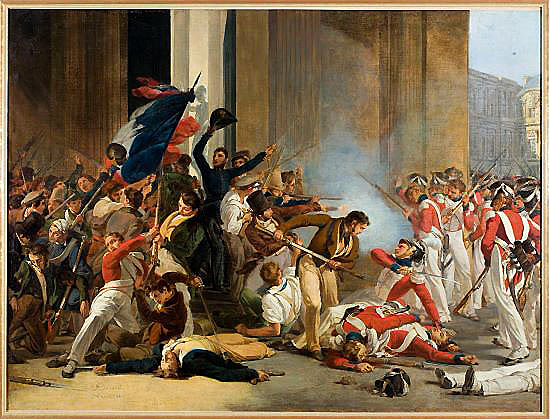THE HUMBLE APPEAR AS AN ANONYMOUS MASS, AS CLICHÉS OR AS THREATS
Paintings about the 1830 upheaval show bourgeois rebels full-faced and individual, and the humble as a crowd, as in traditional representations of war (please click and scroll down).
- The profile of an underclass fighter appears on the left, while three middle-class figures emerge full-face in the right:
Combat à la rue Rohan, 29 juillet 1830 by Hypolyte Lecomte, 1831, zoom
- Figures with recognizable faces are two student leaders, a well-dressed corpse, someone with a top hat, a man in an elegant brown jacket fighting a guard and three guards. The white shirts of two plebeians* light up the center, but they themselves are seen from behind:
*For the association of those shirts with the working class, please click and scroll down to the drawing of the furious militant.
La Prise du Louvre, le 29 juillet 1830, massacre des gardes suisses by Louis Bezard, 1832 / zoom
# # #
In fiction "good poor" are saints, victims, devoted servants or grateful beneficiaries of upper-class charity.
- Les Misérables (1862). The hero is a former peasant and escaped convict, who has spent 14 years in the galleys for stealing a loaf of bread to feed his sick and starving sister. He lifts a cart to save a victim, though he knows that will identify him and send him back to prison:
- Les Mystères de Paris (the first French crime novel, a best seller in 1848). The heroine, an angelic former prostitute, turns out to be the daughter of a prince. To atone for her former profession, which she exercised only for a week and under duress, she becomes a nun. Then she dies. ("Fallen women" are always punished, even if they repent.)
- Uncle Tom's Cabin (1852). The hero is so notoriously docile that an insult among Black is "Uncle Tom."
- Little Women (1866). The girls give their Christmas breakfast, which a loyal servant has prepared, to a poor woman with small children and a newborn. "Angels!" she exclaims. "Funny angels in mittens and scarves," says the heroine, whose humor does not hide the author's complacency:
# # #
The poor who do not fit these stereotypes are threats:
- Les Mystères de Paris. The villainess who forces the heroine into prostitution represents the criminal poor, without background or nuance:
- L'Histoire de l'Hôtel de Ville. A second-rate novel interesting for platitudes on the middle-class hero and underclass criminals:
# # #
The contempt of a middle-class battalion commander for his working-class colleague...
How astonished we were when we learned that, without the least knowledge of how to handle a sword, the head of our battalion sought to console himself of his ignorance in trying to handle the pen.
Citizen Varlin, allow me to tell you that the 193rd battalion forgives you, easily and without rancor, for the strange mind warp of which you are subject; we perfectly understand that the sudden transformation of a man who trades the tools that he never should have left for a sword too heavy for his forces would confuse the most solid mind."
-- Extract of a letter to Eugène Varlin (please scroll down)during the siege of Paris in 1870,cited in My Paris Commune (in French)



.jpg)






.JPG)

No comments:
Post a Comment